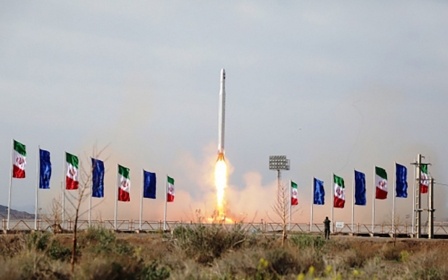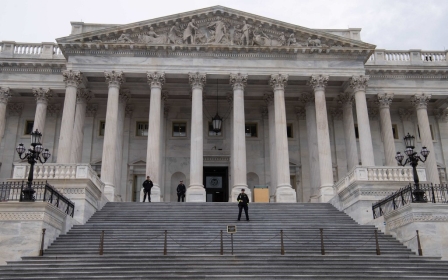Iranian press review: Shah-era diplomat's attack on Trump receives mixed response

Shah-era foreign minister slams US Iran policy
Iranian politicians are divided over criticism by Ardeshir Zahedi, a high ranking diplomat from the Shah era, who used an interview with BBC Persian to denounce the United States' maximum pressure policy against Iran and praise slain Iranian general Qassem Soleimani.
A former Iranian foreign minister and ambassador to the US before the 1979 revolution, Zahedi told BBC Persian TV that the US was exerting economic and military pressure on Tehran because Iranian diplomats “have brought America and its allies, Israel and Saudi [Arabia], to their knees”.
Zahedi, who is a supporter of Iran’s nuclear programme, also condemned US President Donald Trump over the killing of Soleimani, who was killed in a US drone strike in January, and voiced his support for Iran’s army.
“I am proud of him (Soleimani), I was proud of him and I will be proud of him... these [soldiers] give their blood for their country,” said Zahedi.
The 92-year-old now lives in Switzerland in exile and his interview has received widespread and mixed reactions inside Iran.
The pro-reformist Shargh daily, in an editorial without a byline, applauded Zahedi’s support for Iran’s interests and wrote “probably his candid wish is to die in Iran".
Reviewing Zahedi’s career, the semi-official ISNA news agency gave more weight to his role and stance over the 1953 US-backed coup in Iran and concluded: “It is evident that he, as a member of the royal family and a person close to the Shah, is not a supporter or advocate of the Islamic Republic [of Iran].”
Meanwhile, Ataollah Mohajerani, Iran’s culture minister from 1998 to 2000 who also lives in exile in the UK, tweeted support for Zahedi’s comments.
“The Pahlavi dynasty and all inauspicious oppositions supporting regime change [in Iran] would have a better fate if they had a bit of Zahedi’s gentility,” he wrote.
However, Sadegh Zibakalm, a participant in Iran’s cultural revolution from 1980 to 83, who is now a critic of Iran’s domestic and foreign policy, said he doubted Zahedi’s sincerity.
“It seems that concepts such as human rights, [freedom of] political prisoners and freedom of speech have no value for Ardeshir Zahedi. If it was the opposite, he would have not praised the Islamic Republic of Iran,” Zibakalm told Khabar Online.
Jailed journalist attempts suicide
Iranian journalist, documentary filmmaker and political activist Mohammad Nourizad has survived after a suicide attempt in Mashhad’s Vakil Abad prison.
On 1 May, Nourizad cut his wrist with “a piece of glass or razor blade” in protest against pressure placed on his family members, his wife Fatemeh Maleki told Farsi media outlets outside the country.
In a voice message from inside the prison in late April, Nourizad said that the only way left for him to release his family from harassment from Iran’s intelligence service, and to make his voice heard, would be to die by suicide.
A day before his suicide attempt, a branch of Iran’s Islamic Revolutionary Court had handed a three-and-a-half-year prison sentence to Nourizad's son Ali.
Ali Nourizad was arrested in January in Tehran during a ceremony in memory of the 176 passengers who died in the accidental downing of a Ukrainian plane by Iran’s Islamic Revolutionary Guard Corps earlier that month.
Mohammad Nourizad has been arrested several times for political activism and writing open letters to Iran’s supreme leader. Since August 2019, he has been serving a 15-year prison sentence.
In another case involving a jailed journalist, a short letter by Narges Mohammadi, highlighting her harsh conditions in Zanjan prison, northwest of Tehran, has been trending on Farsi social media platforms.
Mohammadi, who is also a human rights activist and serving a 16-year prison sentence, wrote that measures by judicial and intelligence authorities including denying her access to any books.
Last week, Reporters Without Borders said that Iranian journalists who fled Iran and are now in Turkey waiting for the result of their asylum applications are “exposed to the possibility of persecution by the Iranian intelligence agencies”.
Ex-judges defend Bar Association from interference
Scores of retired judges have joined thousands of lawyers who have been campaigning to put a stop to the "illegal interference" of the judiciary in the affairs of the Iran Bar Association.
The judiciary recently proposed a draft bylaw for the association which critics say undermines the independence of lawyers and replaces the Bar with a group of government-appointed judiciary officials.
In a letter on Monday to Iran’s Chief Justice Ebrahim Raisi, 180 former judges, 60 of whom had served on Iran's Supreme Court, urged the judge to stop the proposal, Iran’s official news agency IRNA reported.
The former judges underlined that any changes to the Bar must be proposed by the association itself and not by the judicial system.
The draft bylaw, which was proposed by the legal department of the judicial system, calls for the formation of a new seven-member committee to coordinate “matters” between the lawyers and the judicial system.
Only two members of the committee would represent the lawyers, with the other five appointed by the government.
On Saturday, over 12,000 lawyers and members of the Iran Bar Association also voiced their opposition to the draft bylaw, warning that it would curb the independence of Iranian lawyers, the ILNA news agency reported.
* Iranian press review is a digest of reports that are not independently verified as accurate by Middle East Eye
Middle East Eye propose une couverture et une analyse indépendantes et incomparables du Moyen-Orient, de l’Afrique du Nord et d’autres régions du monde. Pour en savoir plus sur la reprise de ce contenu et les frais qui s’appliquent, veuillez remplir ce formulaire [en anglais]. Pour en savoir plus sur MEE, cliquez ici [en anglais].




